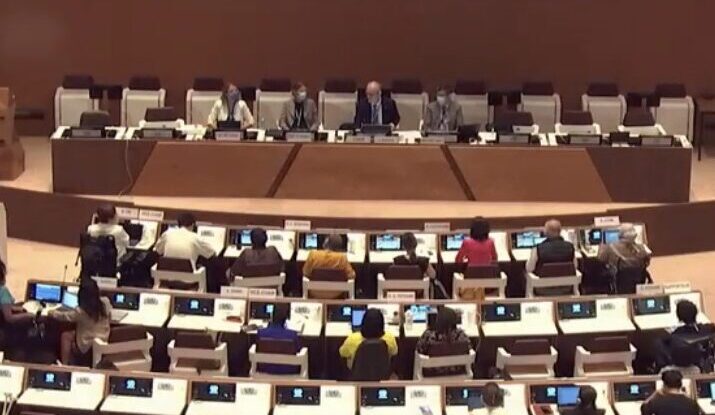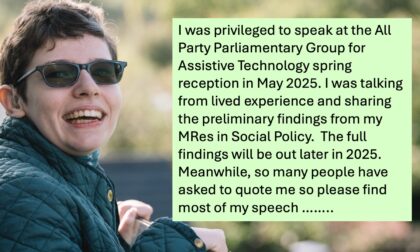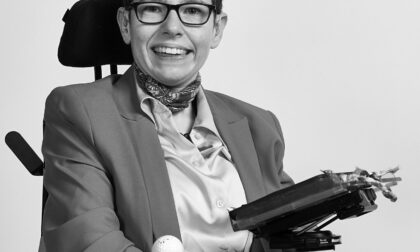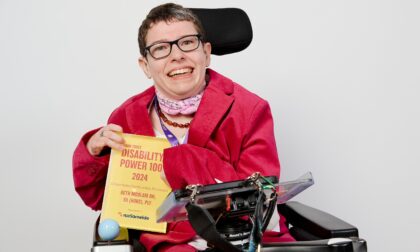I’ve been a committee member on the International Communication Rights Alliance (ICRA) since January 2021. ICRA has been working towards operationalising communication rights for those with comprehensive communication needs. Jacob Matthews of Australia and I had the opportunity to speak on behalf of ICRA at the opening of the 27th session of the United Nations CRPD committee. This was held in Geneva, and we attended via video link, on Monday 15 August 2022.
ICRA works on behalf of all those with communication impairments, it is a collaboration between the International Society of Augmentative and Alternative Communication (ISAAC), Deafblind International (DbI) and the International Council for Education of People with Visual Impairment (ICEVI). As a first step committee members undertook a review of state party reports.
As a user of augmentative and alternative communication (AAC), I have grown up knowing that AAC is already mentioned within the CRPD. And, that communication underpins all of the Articles in the CRPD. Specific mentions of AAC are in:
Article 2 ‘definitions’.
Article 21 ‘Freedom of expression and opinion and access to information’.
Article 24 ‘Education’ in both
a) facilitating learning including through peer support and mentoring, and
b) employing those with communication disabilities and training staff in the use of AAC.
What I hadn’t initially appreciated was the gap between what is written in the Articles and what is actually delivered by state nations.
The key points of the ICRA presentation were:
- State party reports typically focus on uni-directional information to disabled people, often requiring the use of technologies such as computers, websites and the internet. These interventions can prevent discriminatory practices, however, there are no minimum standards or guidance for accessible personal interactions. The result is there is no obligation for signatories to aspire to achieve a common standard and the communication rights of those with complex and diverse needs are not explicitly considered.
- State party reports often cover essential services and activities where accessibility has been improved. For instance, in hospitals where consent is needed, however, there appear to be no legal frameworks to uphold these actions. Without guidance defining the minimum skills and attitudes required by service providers and staff, the needs of those with comprehensive communication needs remain unmet.
- Communication rights need to be addressed not just at prescribed times such as an election, using public transport and in education. But in every waking moment of everyday life where human interactions occur. This requires a level of skill and confidence by communication partners to ensure the rights of those with comprehensive communication needs are upheld.
- There is a need to raise awareness of comprehensive communication needs, along with the unique and specialised competencies needed both to use assistive technologies and those required by communication partners.
- Disaggregated data relating to people with comprehensive communication needs is currently not reported. This information could provide a basis for informed action.
Below is a full transcript of what was presented to the CRPD committee:
“On behalf of the International Communication Rights Alliance, we would like to thank this UN committee for agreeing to hear our call to action, why we believe there is a need for such an alliance, and what it aims to achieve. We recognize the significance of the 2006 Convention on the Rights of Person’s with disability, and the actions and commitments documented by signatory countries. We would like to highlight that ‘communication’ defined in Article 2, underpins all the articles of the CRPD.
Disability can result in comprehensive communication needs that take many forms. Shared meaning-making can be affected by impairment of body structure and function, but also level of education and personality, and environment including communication partners’ skills and attitudes.
Our review of States parties reports to the CRPD committee highlights a notable omission that impacts people with comprehensive communication needs. In these reports, communication typically refers to uni-directional information to people with disability, often requiring technologies such as computers, websites, internet and telecommunications. Whilst these interventions can prevent discriminatory practices, they do not set minimum standards and guidelines for accessible interpersonal communication, that may be needed by persons with diverse needs. This lack means no country is obliged to conform to such standards, work towards or even aspire to achieve them.
Some groups of people’s needs are addressed in these reports, such as people who are Deaf, but others with more complex and diverse needs are not explicitly considered. This omission needs to be addressed to ensure the communication rights of all are upheld.
These reports cover some essential aspects of communication accessibility, such as making written information accessible in a variety of formats and processes. They cover essential services and activities where accessibility has been improved, such as in the justice system or elections. There are examples of guidelines, such as in hospitals where consent is needed, but there are no legal frameworks to uphold them. The majority of reported actions taken are in relation to technology, such as captioning, sign language on television and improving access to communication technology itself. There is no guideline which defines the skills and attitudes required by service providers and staff more broadly to ensure access for people with comprehensive communication needs.
The discussion on supported decision-making is a good example of where communication as a barrier is actually noted, but no follow-up in terms of guidelines and standards to uphold these requirements is available. The CRPD Committee stated that three important aspects must be complied with. All of these requirements need a level of skill and confidence of communication partners to ensure these rights are upheld.
Communication rights need to be addressed at both prescribed times such as an election, when using public transport, and in any educational setting as well as every waking moment, of every day in every context of life in which human interaction occurs.
Also, disaggregated data relating to people with comprehensive communication needs is not currently reported and could provide a basis for informed action.
We are asking the CRPD committee to take note of our position and use it as guidance within your work, and strongly encourage the inclusion of certain actions and strategies by States and the inclusion of corresponding disaggregated data in relation to people with comprehensive communication needs.
The International Communication Rights Alliance requests that the UNCRPD Committee recognise and acknowledges issues pertaining to people with communication needs as fundamental to achieving comprehensive communication rights by:
- taking note of our position and using it as guidance within the work of the CRPD committee.
- including the actions and strategies by States to address communication rights as well as corresponding disaggregated data in relation to people with comprehensive communication needs
- raising awareness of comprehensive communication needs and the needed unique and specialised competencies and assistive technologies.
- including action/s on addressing or further enhancing communication rights in the recommendations made in the UN in response to a state report.
We thank you for your time.”
The ICRA contribution can be seen around an hour in on the UN Web TV
You can follow The International Communication Rights Alliance on social media
Facebook: https://www.facebook.com/ICRAlliance/
Twitter: https://twitter.com/ICRAlliance
Instagram: https://www.instagram.com/icralliance/
Linkedin: https://www.linkedin.com/company/international-communication-rights-alliance-icra/
Meanwhile, if you are interested in your rights take a look at my page Know Your Rights





If you found this interesting or
helpful please feel free to share.